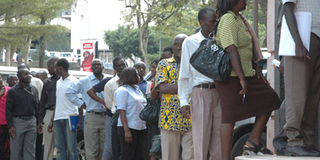Teacher certificate forgeries overwhelm government

LEGAL MEANS: Teachers who recently qualified from Teacher training colleges pick their certificates from the Ministry of Education officess in Kampala recently.
The Ministry of Education has said it is overwhelmed by the number of teachers who gained employment using forged documents. Dr Yusuf Nsubuga, the director Basic Education, said yesterday that a survey found that all districts in eastern Uganda have several cases of forgeries. The same has been discovered in central region as investigations continue in other parts of the country.
Dr Nsubuga added that the teacher validation, so far, reveals that some appointed teachers give their appointment letters to other people who are not qualified.
“There are still many concerns on quality education and because we lacked teachers at one time, people took advantage and forged certificates. Those qualified give their appointment letters to others. These teachers are in class teaching our children,” Dr Nsubuga said at the launch of Uwezo Uganda report.
“When there are interviews, they come and present themselves and because district officials don’t have machines to detect forged documents, they are recruited into the system.”
Uwezo, a Kiswahili word meaning ‘capability’, is an initiative seeking to fill the gap in educational assessment and social change by generating household-based information on children’s literacy and numeracy across East Africa.
He said the ministry can only fight the vice if recruiting agencies go back to demand registers from the teaching institutions to justify the persons before they are employed.
Humble request
“We request that district officials go back to teaching institutions and pick registers so that they can have a copy. They should also demand for photographs of applicants, one which must remain at the district offices, another goes to the school where they have been posted,” Dr Nsubuga explained.
Uwezo country coordinator Richard Ssewakiryanga said citizen engagement is essential for creating public pressure needed to hold leaders and service providers accountable.
The findings indicate that 98 per cent of P3 children sampled could not read and understand a story text of P2 level. Also, 80 per cent in the same class could not solve at least two numerical written division sums of P2 level correctly.
Dubbed Uwezo 2010 Assessment Learning Report, the document involved a team of 1,620 village-based volunteers, visiting 16,200 households in 27 districts and administered a Primary Two test in literacy and numeracy to 34,752 children between the ages of six to 16.




